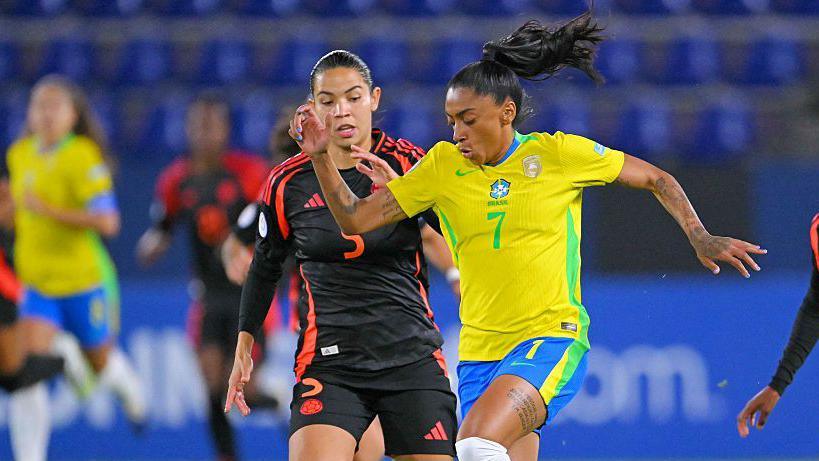Women's Copa America criticised after Euros success

Brazil beat a joint bid by Belgium, the Netherlands and Germany to host the 2027 World Cup
- Published
While this summer's Euro 2025 was marked by record attendances, a smooth operation and memorable performances capped by England's triumph, the women's Copa America has suffered in comparison.
As Brazil and Colombia prepare for Sunday's final, the tournament in Ecuador has come in for criticism for poor organisation, low attendances and below-par refereeing.
With Brazil hosting the 2027 World Cup, it was hoped Conmebol would raise its game, and standards, for the Copa America Femenina after similar problems at the Copa Libertadores Femenina in Paraguay.
Brazil legend and six-time Fifa Player of the Year Marta has been vocal in her criticism, questioning organisers for making teams warm up in confined indoor areas rather than on the pitch.
Images spread on social media, before her country's dominant Group B win over Bolivia, of players from both teams warming up side by side in a confined area at the Gonzalo Pozo Ripalda Stadium.
The measure was taken to prevent damage to the pitch, which hosted two matches in a day during the group stage, and left the 39-year-old Marta "saddened by these circumstances".
Manchester City's Brazil forward Kerolin reflected on the difference with the Euros as she wrote on her X account: "While at the Euros they are breaking records in technology, we are warming up in a room with a maximum of 20 square metres, smelling of paint."
Marta scores stunner as Brazil retain Copa America
- Published3 August
'Structural issues' at Copa America compared to success of Euros
As the Euros soared to greater heights, there were more lows at the Copa America.
Crowd totals in Switzerland came to 657,291 - a new record for a women's European Championship - with the average for a game topping 20,000 for the first time.
Even before England retained their title by toppling world champions Spain in the final, a number of players had praised the tournament's organisation on and off the pitch.
That has not been the case in Ecuador.
Brazilian journalist Julia Belas highlighted "structural issues" at the competition as she told BBC Sport: "The Copa America has been heavily criticised by the players, staff from the teams and the federations, especially because of the structure, the lack of structure, they have provided to the teams participating.
"For example, they were only using two stadiums within the group stage, so all of the games were played in only two stadiums and that meant the pitch quality wasn't great.
"For two rounds, the players weren't able to warm up on the pitch to try to preserve the quality of the grass. At the same time, you know, just the structural issues that we've seen before in other Conmebol competitions such as the Copa Libertadores."
'Conmebol needs to pick up the pace'
South America will host its first women's World Cup in 2027 and it has a lot to live up to after the success of the 2023 competition in Australia and the past two Euros.
Fans also showed up in their thousands for the Women's Africa Cup of Nations with 150,000 spectators thought to have bought tickets as Nigeria lifted the trophy.
When asked if the Copa America was a good look for the continent, Belas added: "No, not at all.
"It is the first time the Women's World Cup is going to South America and, of course, part of the bid was the fact that we have huge stadiums in Brazil that were used for the men's World Cup 11 years ago.
"Conmebol really needs to pick up the pace because we've seen such an amazing World Cup happening in Australia. We've seen the Euros in Switzerland drawing 100,000s of fans, even in the Africa Cup of Nations we've seen stadiums with heavily attended games.
"In the Copa America, we don't even know the numbers of fans who are at each game. It's difficult to compare with other continents at the moment. With only two years to go to the World Cup, they really need to step it up."
BBC Sport approached Conmebol for comment.